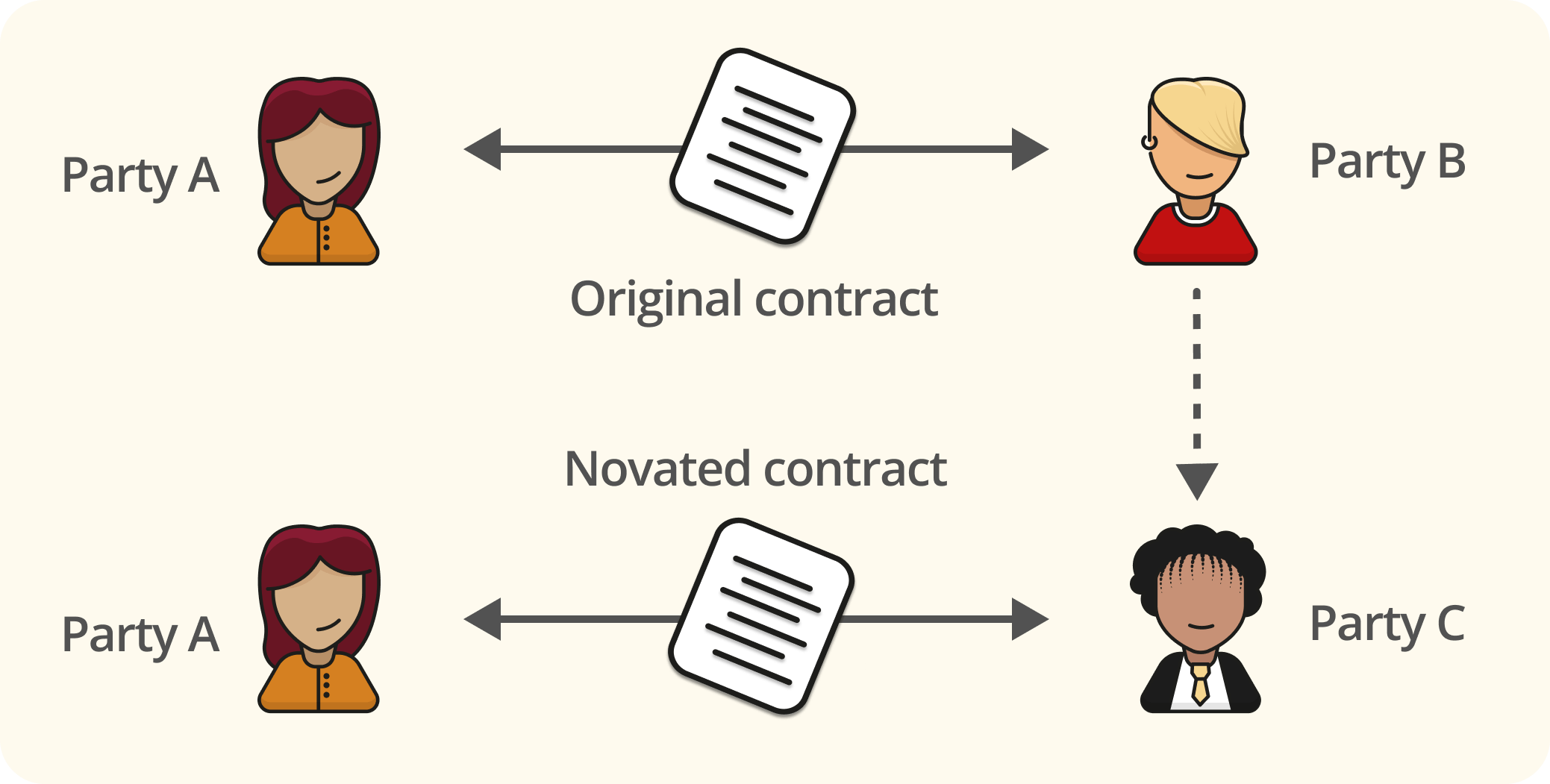What is novation?
Novation is the process by which a new party replaces one of the original parties to a contract. In essence, the original contract is extinguished and replaced with a new one, under which the new party takes up the original rights and obligations of the party it is replacing in the original contract.

This means that the original party transfers both the benefits and burdens under the contract. The benefits could be in the form of money or the benefit of a service, while burdens are what the party is obliged to do to receive the benefits. For example, payment for a service or goods, or the performance of a service.
What’s the difference between novation and variation?
Contract novation differs from contract variation, as contract variation generally involves the parties to a contract changing the contractual terms to give way to a new substituted contract between the same parties, rather than the transfer of those terms to another party.
What’s the difference between novation and assignment?
A Novation agreement transfers both the benefits and the obligations of a contract to a third party.
In contrast, an assignment does not transfer the burden of a contract, only benefit (different rules apply for leases). This means the outgoing party remains liable for any past liabilities (eg payments due) incurred before the assignment. For more information, read Assigning a contract.
How do you novate a contract?
Consideration and consent
Novation is a complex process and to ensure it takes effect legally, the parties must ensure that the novation of the contract includes consideration and consent.
Novating a contract eliminates the original contract and forms a new contract in its place. As with any contract which is formed, consideration (ie the promise to confer something of value, which is exchanged between parties) is required for the new contract to be valid. This consideration could sometimes include the discharging or release of the original contract. If you are unsure whether adequate consideration has been given for the novation of the contract, you should sign the contract as a deed or Ask a lawyer for assistance.
While the benefits under a contract can be assigned without the other party’s consent, contractual obligations cannot be assigned without all parties’ consent. This means that the original party can only achieve novation if both the new party and the other original party agree to a novation. This may be difficult in some cases, for example when there is a change of supplier of services. The other original party may find it difficult to agree if they don’t see the benefit of novating the contract or may ask for further assurances that they won’t be worse off as a result of the novation. In these cases, the party wishing to novate the contract should be prepared to negotiate with the other party.
Whilst consent to novation can sometimes be inferred by the conduct and actions of the parties, signing a Novation agreement can help you to prove the consent of all parties if needed in the future. Ask a lawyer if you need advice based on your specific circumstances.
The novation process
The most effective way of carrying out novation is for all the parties involved (ie the original parties and the new incoming party) to sign a Novation agreement. This will end the contractual relationship between the original parties and create a new contractual relationship that includes the new incoming party.
Once all parties have agreed to and signed the novation agreement, the novation becomes effective. The rights and obligations under the original contract are transferred to the new party, and the original party that is being replaced is released from those obligations.
Keep thorough documentation of the novation process, including the novation agreement and any correspondence related to the novation.
Parties wishing to novate their contract should carefully check the contract’s terms as, sometimes, there may be a provision in a contract that will prohibit all transfers of the rights and obligations under the contract or it may specify how consent to such transfers is to be acquired.
Keep in mind that the specific steps and requirements for novating a contract may vary depending on the nature of the contract and the applicable laws. For more information, read How to form a valid contract. Ask a lawyer if you need help novating a contract.
What happens after novation?
After the contract is novated, the outgoing party (ie the original party that has been replaced) is usually released from any liability or responsibility for legal claims in respect of the original contract that arise on or after the date the novation agreement was signed. However, unless specifically provided for under the novation agreement, novation generally does not cancel any past rights or obligations, ie those that arose in relation to the original contract before novation.
Parties to a novation agreement might also agree to indemnify each other via the novation agreement (ie make a promise to each other to compensate any losses that the other party incurs due to the acts of the new incoming party or any other party), which would mean that the outgoing party could still be held accountable for certain losses or harms incurred by the remaining or incoming party in the future. For example, the outgoing party could agree to indemnify the incoming party concerning any liabilities and obligations the incoming party agrees to take over. The incoming party can agree to indemnify the outgoing party in respect of any liabilities that the outgoing party retains.




